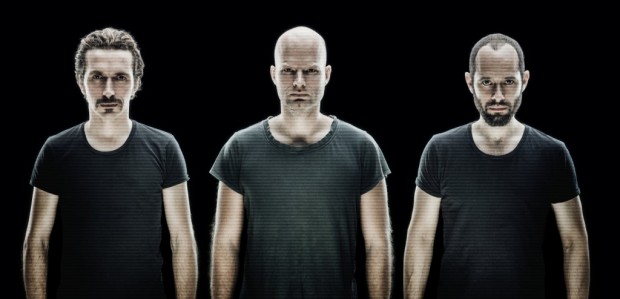 WHOMADEWHO are three enigmatic Danes whose musical output exists somewhere between dancey experimental electro-indie rock and pop. Before the release of their fifth studio album, Dreams, Nothing But Hope And Passion sat down with band members Tomas Høffding and Tomas Barfod to discuss the past ten years of the band’s evolution. This took place just before they were set to preview their new songs in a “half-acoustic” live show at a small Berlin venue packed with enthusiastic fans.
WHOMADEWHO are three enigmatic Danes whose musical output exists somewhere between dancey experimental electro-indie rock and pop. Before the release of their fifth studio album, Dreams, Nothing But Hope And Passion sat down with band members Tomas Høffding and Tomas Barfod to discuss the past ten years of the band’s evolution. This took place just before they were set to preview their new songs in a “half-acoustic” live show at a small Berlin venue packed with enthusiastic fans.
You guys have been together for awhile now.
Tomas Høffding: It has been 10 years since we first got together to make music – maybe more than 10 years? We should have our Jubilee soon –
You formed in Copenhagen?
TH: Yes, but we are from the countryside.
You’ve been quite prolific, in terms of output.
Tomas Barfod: Well, one album every second year isn’t that crazy.
TH: Well, then there is the solo stuff.
TB: I’m not saying that we are lazy or slow or anything, but what we do as a band is not that aggressive.
I encountered something on your website you’d mentioned that is pretty unusual – the ‘double or die’ motto? Either you double your fan base with each album or you quit? That’s an interesting sort of goal for a band.
TB: Well, the band started very sideways. We met Monday evenings and produced the album. We drank coffee – it was super – and we just made this for the sake of getting out and playing.
TH: The music comes from rock and songwriting, and, honestly, I’m always embarrassed to tell the story – but I knew nothing about electronica, I was into rock and songwriting and I was like: ‘Electronica?!?’ I thought it was so stupid – I thought it was just this guy standing with the DJ. Then we met one night and we recorded this cover version of Satisfaction and Tomas sent me the files but he accidentally sent me the original of Satisfaction and I didn’t actually know the track so I thought: Hey, that’s pretty cool, like – we made it fast! And that’s how much I knew about electronica. It was so much fun, though – for three years we never rehearsed and we’d always just get drunk and dress really strangely and when we farted everyone was like “Woo-hoo! Fantastic!” – but after a few years, well, you know how it is cool if you do stuff when you are a small child but then you are a teenager and your feet start to smell then you need to pull yourself together.
TB: And we stopped farting.
TH: At some points we farted and it didn’t work. Have you seen the movie Anvil [full title: Anvil: the Story of Anvil, a documentary about a Canadian heavy metal band]? About this band that fucks up? We just got this nightmare vision of us going down down …down-
TB: They’re actually a good band – there’s nothing wrong with them except they made the wrong choices and they ended up sucking. They had bad jobs and horrible gigs and I was just like: That’s what happens with many bands. They go down slowly and nobody notices it because they like playing and they like attention and slowly less and less people show up for the concerts and I was just like: guys! Let’s go double or die. I think also being a hyped band in the beginning – like GWAR – it’s very easy to get hyped in the beginning and end up with cool gigs: when you start like that, you run the risk of losing perspective on what it is to be a band or to fight for it [recognition] because it was so easy. We made a demo, got a deal, and the best gigs you could dream of for a band like us.
TH: And we actually just shit on the gigs.
TB: Yea, but at some point it wasn’t fun anymore. For the audience or for us. We still had our fan base – they kept on, and the journalists liked us but it was unclear where we would end up.
WHOMADEWHO: The funny thing is, about four years ago we told ourselves everything was going to double or we would quit. We were quite serious about it.
So it seems like you imposed some restraints?
TH: The funny thing is, about four years ago we told ourselves everything was going to double or we would quit. We were quite serious about it. It doubled and that gave us a new perspective, not just an “Uh, whatever’ – we are kind of more serious but we also realized that we couldn’t make double or die for many years.
Before – exponentially – I guess eventually everyone would inevitably have to be in your audience?
TH: Right.
TB: We succeeded in integrating it as a part of our thing because it got us to be serious. Now we think: if we want to do something, it is possible IF you do it right, and that is how we do music and move forward with our career now. We think about what we do and we set some goals and go for them instead of just ‘Yea, – we’ll do that, go to a strange city and play some fucked up gig – that’s fun!’ We’re more strategic now.



